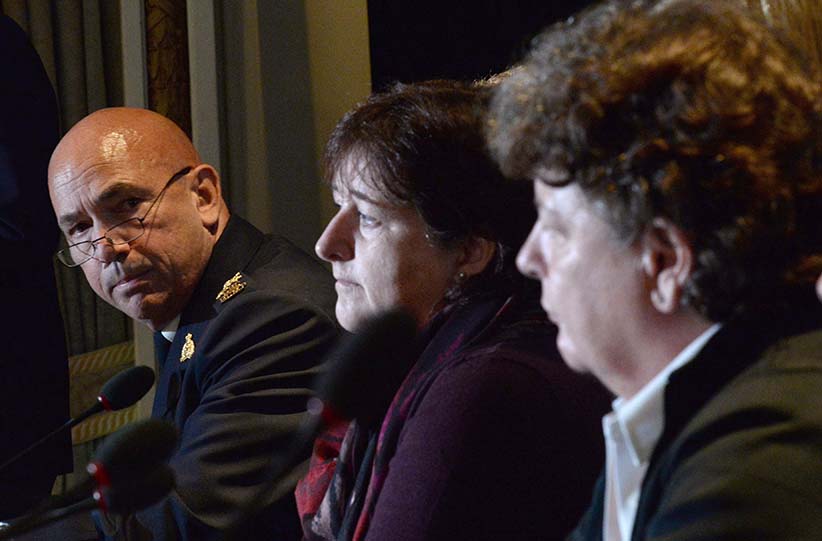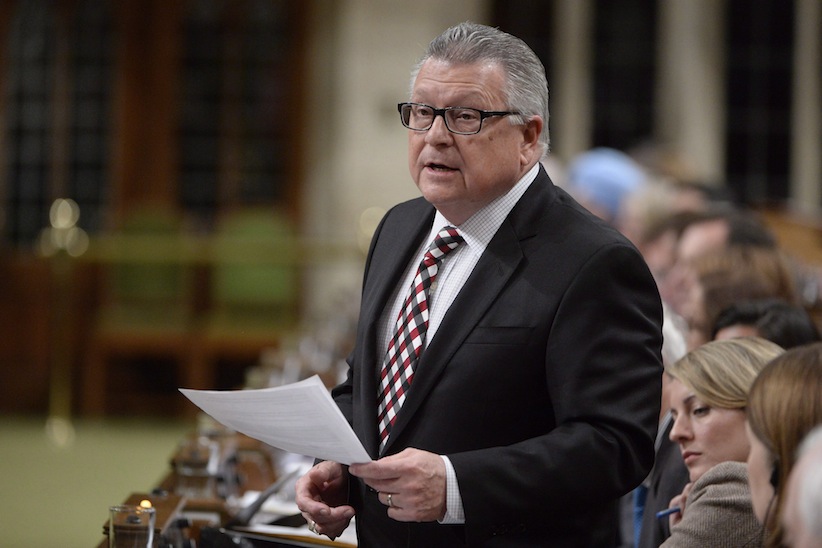Who will pay for the RCMP’s epic failure?
The careers and lives of women in the RCMP were ruined. Yet an apologetic RCMP refuses to truly be accountable.
RCMP commissioner Bob Paulson, left, answers a question during a news conference, as plaintiffs Janet Merlo, centre, and Linda Davidson look on, in Ottawa Thursday, Oct. 6, 2016. Paulson has apologized to hundreds of current and former female officers and employees for alleged incidents of bullying, discrimination and harassment. (Adrian Wyld/CP )
Share

On Oct. 4, Canadians were whipped into a froth of righteous indignation by an act of criminal harassment toward someone just trying to do his job—the odious beer-can toss by a Blue Jays fan at a Baltimore Orioles’ left fielder during the American League wildcard game. Toronto police issued a photograph of the presumed suspect within a day. The Toronto Sun ponied up a $1,000 reward. Toronto Mayor John Tory expressed disgust, calling the perp a “loon-ball,” and encouraged those sitting nearby to turn the person in. Orioles manager Buck Showalter was rightfully protective of his players: “I don’t like anything that would put our guys in harm’s way,” he said. Hours later, a man turned himself in and was charged with mischief. His name—and his employer’s—was splashed everywhere. The Rogers Centre took measures to ensure players were safe from such risk again; beer is now served in plastic cups.
So where was the similar chant for accountability two days later, on Oct. 6, after RCMP Commissioner Bob Paulson’s shockingly inadequate apology for far more grievous workplace assaults against potentially thousands of female RCMP officers? After decades of allegations and lawsuits, the RCMP finally admitted rampant rot within its ranks with the settlement of two class-action suits. The government put $100-million aside, with no cap on payouts. A former Supreme Court justice will adjudicate who gets what based on six levels of assault, institutional determination of abuse and its consequences. Some 20,000 female RCMP employees—dating back to 1974, when women were first allowed to enlist—technically qualify.
In addressing the women and the nation, Paulson had the audacity to suggest the “agreement demonstrates an RCMP that is accountable to its employees and its citizens.” Yet there has been no systemic hunt for those who perpetrated this abuse, not even the firing of a sacrificial lamb. True, tracking down one beer-can-throwing lout is easy next to reviewing hundreds of cases—a fact that’s an indictment, not an excuse. If only the RCMP possessed tools to embark on a criminal investigation.
That Paulson was the one issuing the apology reveals wilful blindness still surrounding the issue. The nation’s top cop spoke emotionally about women who “stayed and were forced to find ways to cope with this inexcusable condition, since they did not see an organization that was willing to change.” That would be the organization headed by Paulson, who joined the RCMP in 1986 and was promoted to commissioner in 2011 with the mandate to address sexual harassment. Expecting a career Mountie to ferret out systemic abuse is problematic, as we’ve seen in Paulson’s repeated denials of a culture of systemic sexual abuse in the RCMP before Parliamentary and Senate committees. In 2012, he actually referred to “meritorious victims, legitimate victims.” In 2013, he said sexual abuse “happens occasionally” and expressed exasperation over “continually defending over outlandish claims.” Paulson was also at the helm when the RCMP implemented its 2013 “action plan,” titled “Gender and Respect,” with measures that included centralizing complaints, which made it easier, in theory, for someone in a small detachment to report with less fear of reprisal. It also clamped down on retaliatory behaviour toward anyone who came forth. Still, female RCMP officers feared being fired for reporting abuse, as they wrote to MPs and senators last year.
Paulson’s apology also soft-pedalled the scope of the violation. Women “suffered careers scarred by gender and sexual discrimination, bullying and harassment,” he said. More accurately, careers and lives were ruined by reported rape, physical assault, unwanted sexual touching, sexist comments and threats directed at gender and disability. Also ignored was the fact that systemic, flagrant abuse within the RCMP extended into policing women on the social margins. A 2013 report from New York City-based Human Rights Watch claimed RCMP officers physically and sexually abused, threatened and tortured Aboriginal women and girls in northern B.C.

Meanwhile, a Liberal government—one that claims to take violence against women seriously—stood by in nodding accord, represented by Public Safety Minister Ralph Goodale and Labour Minister MaryAnn Mihychuk. Goodale, who inherited the cesspool file, took a “Move along, folks, nothing to see” stance: The apology and payout “closes the door on a deeply troubling and unfortunate period in the history of our national police force,” he said.
Certainly women consumed with seeking justice for years expressed relief, which is understandable. Finally they’ve been recognized and believed. It was a “great day,” Sherry Benson-Podolchuk, a former RCMP officer who endured decades of harassment told Maclean’s. (She once found a slaughtered prairie chicken, dripping blood, in her work locker.) When asked how many female officers were subject to some form of abuse, her answer was chilling: “All of them.”
So to accept that payouts (presumably with accompanying silencing non-disclosure agreements) solves all is to ignore clear messaging that the safety and health of thousands of female RCMP officers matters less than that of one outfielder. It sanctions no quest for accountability for decades of abuse. It overlooks the huge gender imbalances existing within the RCMP that give rise to systemic abuse, including a tiny percentage of women in top ranks. Yet Goodale expressed hope that the actions taken will “help strengthen Canadians’ faith and trust in their national police force.” That police force was once famous for always getting its man. No more.